#is neurodivergent i will not take criticism
Explore tagged Tumblr posts
Text
some people wonder who tf thought calling a grown man bunny was normal, and i can only answer with this video.
#like dont ask ME how i am linia either its way too similar#the experience of having the worst nickname#is neurodivergent i will not take criticism#like bunny corcoran is canonically neurodivergent wtf did you expect his name to be??? ned#if this man was ever called ned or eddie i think he would have hopped off that ravine himself
0 notes
Text
SO I just wrote a massive post about Raph and what I think of his character across the various itterations, and I mentioned that I see myself in Raph - especially 12!Raph. But also 18!Leo. So I made these.
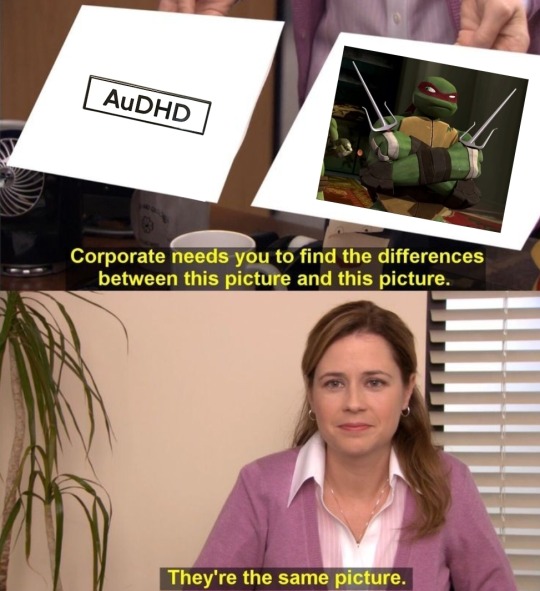
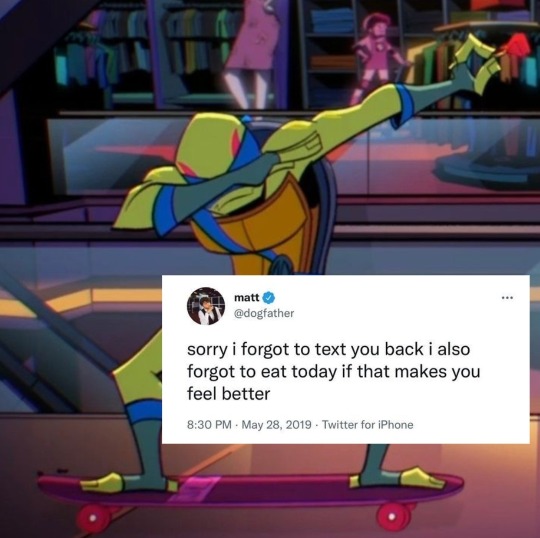
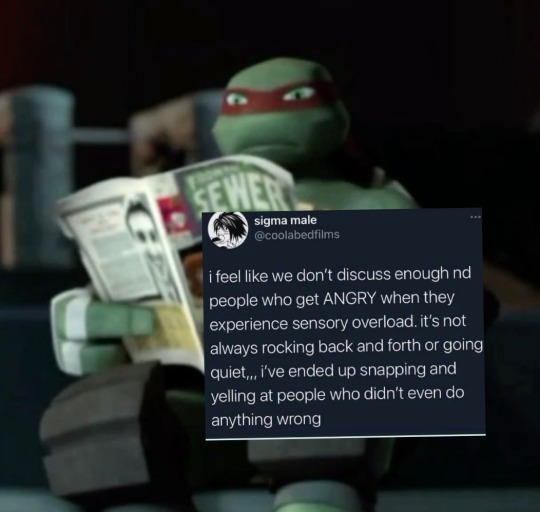
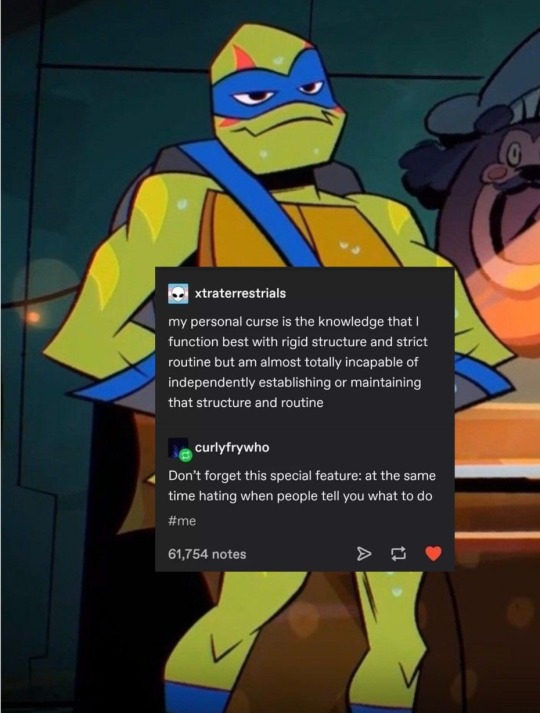
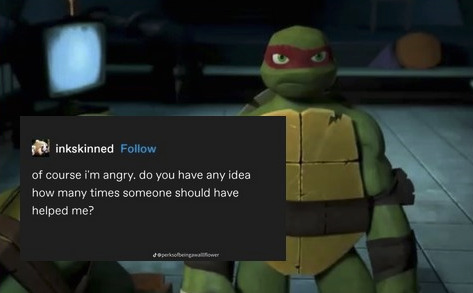
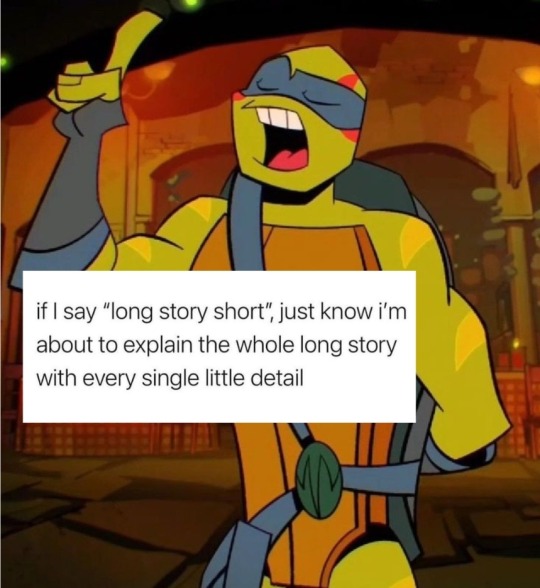
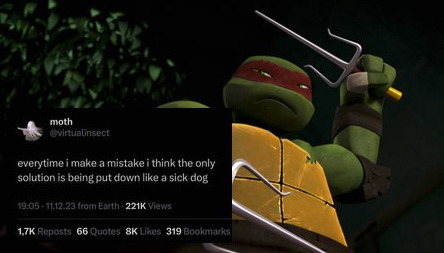
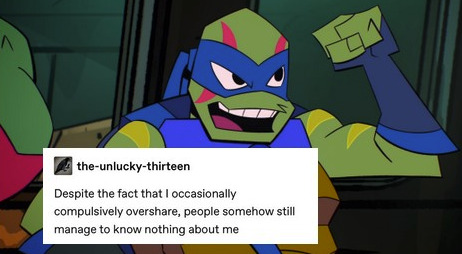
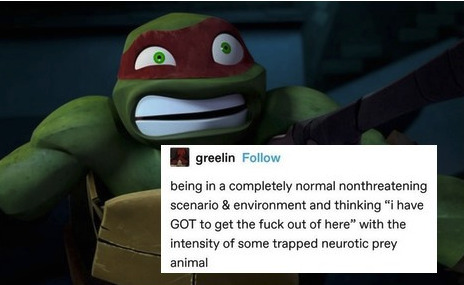
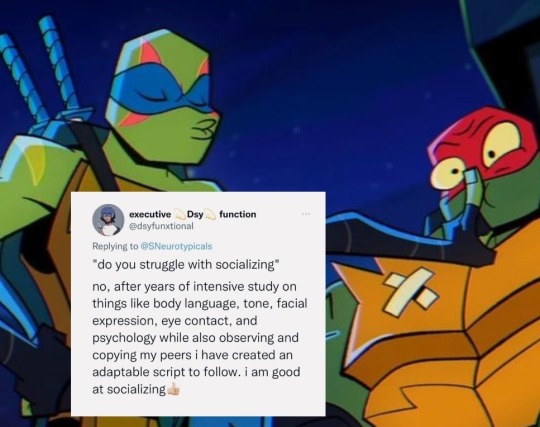
#I shall be taking no criticism.#(everyone is entitled to their own opinions)#tmnt#teenage mutant ninja turtles#rise of the tmnt#2012 raph#2012 raphael#2018 leonardo#rottmnt#rottmnt leonardo#rottmnt leo#2018 leo#why are there so many tags for their names *sob*#adhd things#audhd#autism spectrum disorder#neurodiverse stuff#its the neurodivergency#tumblr memes#they would hate each other if they met as fifteen-year-olds - i love them so much#tmnt incorrect quotes
165 notes
·
View notes
Text
Orpheus is honestly so real like I thought he was a little too desperate at first, but now I’m realizing that he’s so valid for taking every damn opportunity at love because OH MY GOD when I tell you how bad the guy I like has me rn like guys if he doesn’t fall in love with me I’m not going to be ok
(Ignore how badly I’m rambling in the tags I have way too much going on in my head and so I’m throwing at tumblr)
#High school crush but make it neurodivergent and 1000% more emotionally unstable as a result#I can’t stop talking about him guys#Please he has me in shambles#Adding SG Orpheus to the top of my kin list until I find someone lmao /hj#resonating with the whole “love isn’t real” vibe rn and it’s not very preppy#I’ve never related to Laufey’s music more in my LIFE#Stray gods#mentioned because this post is only affiliated with the fandom in the way that I’m twinning with bbg Orpheus rn and his hopelessness of lov#If you think I’m being dramatic#um no you don’t#not taking criticism#im an emotional wreck and a teenage girl and also seeing that I’m even a fan of this game to begin with#My emotional state isn’t very promising
6 notes
·
View notes
Text
‘I don’t see nobody taking action’ well shit
#this is about mens mental health#and because I’m me and I’m also (likely) right#always to do with the crossover of neurodivergence and ableism and colonialism and patriarchy#and capitalism too if you wanna go there but mostly. ableism being toxic masculinity shit#colonialism taking away our ability to appreciate yourselves ESPECIALLY if you’re a poc#and idk. making women do emotional labour is part of that so the outro is. interesting#but if I don’t apply critical gender to theory to it it’s kinda cool. not quite a man but hey. levitate me. take me to the sky. sounds fun#the canyon#blood on the drums#ashton irwin#5 seconds of summer#5sos
3 notes
·
View notes
Text
Starting pride month with the pharmacy denying me my testosterone prescription until mid-June and my doctor saying she can't do anything about it because it's a controlled substance 🙃✌️
#i should also add that it's been a week of trying to get her respond to the messages#'hey i don't want to be off my t for a month'#[full day of silence]#'sorry i don’t know why you can't get your refill but i can't do anything about it'#i am going to lose my mcfucking mind#that's not to mention a long argument where my now former friend#because they're one of those 'trump and biden are both equally bad' people who's planning on just letting trump take power again#because they seem to think that you can boycott a high-level politician in a critical election like it's a fucking soda company#for someone who used being communist as a justification for it#they sure have a very capitalist perspective on politics#i also couldn't fall asleep until literal dawn this morning because i forgot my sleep aids#and then when i did fall asleep i had a solid hour of nightmares#and tw for neurodivergence-based disordered eating for this next one#but my brain hasn't let me eat much of anything all day because it's not 'the right food'#it also will not tell me what 'the right food' is#anyways pride month is off to a pretty shitty start#OH and work changed my schedule from working mids to working primarily night shifts without telling me#and my ortho's advice for my wrist fucked it up a lot more and she hasn't responded to my email from a week ago#i'm fucking miserable#if you need me i'll be playing stardew and listening to sad gay music#personal#vent#rant
2 notes
·
View notes
Text
Silly but the DūnM3sh nonsense around the last episode has me thinking about how like idk mostly white autistic folks (of the vairety who are not in need of higher assistance) online act like ALL autistic folks exhibit the exact same symptoms and behaviors in social settings when like I find mostly other poc and a lot of women regardless of race have very different experiences with the sort of "stereotypical" reaction and behavior that's most often associated with autism. Which leads to a lot of you assuming we are neurotypical and then this line of thinking extends into your reading of autistic characters, be they headcanons or canon characters. Rest of this is going under a read more
Like idk for a poc, theres already very little grace given to us in social situations, especially when around white people. You guys dont realize but we are consistently aware that no matter what, when we enter a space with y'all there will always be an internal bias present in white people that will deem any behavior of confrontation as inherently aggressive or mean.
So we learn to navigate social situations with an already high level of need to analyze so many of the behaviors and cues of the people around us out of complete necessity. Neurodivergency or not, this becomes a matter of survival. And for some people, like me, the need to do this and possibly avoid and save yourself the pain of having people who's racism is a potential harm to you becomes a priority in your brain more than anything else you have going on. You cant completely shut everything else out about your neurodivergency but you learn enough to keep yourself safe. It's what I was forced to learn when I was like 5-13 because I was relentlessly bullied for my race and ethnicity, and later for my incapacity to not understand certain social cues or even break rules until I was about 12/13.
I'm not completely without symptoms and if anything some of them have gotten worse. I struggle now with knowing when to stop talking until I notice people start looking bored or annoyed and I sometimes dont talk enough for fear of being annoying to people I'm close to. Not to mention I'm ALWAYS double checking what I say in a way that's almost like a compulsion. Like constantly, to the point where before I say something with say like factual information, I like quadruple plus plus check everything on Google before I say it (and even then I might get shit wrong and my reaction to that is....oh boy). And even then I sometimes end up not saying anything because I'm too scared I said something wrong and mislead or upset someone. Or worse, this information is unwarranted and annoying.
If anything I'm someone who's neurodivergency made them OVER COMPENSATE the need to pick up on social cues, eye contact, sociability, etc because it was a way to defend myself (by making it harder to pick on me without push back) or keep myself safe.
But at the end of the day the constant need to keep up with ALL of this burnt me out by the time I was in college and it made me incapable of masking very many noticeable things anymore, especially my over sensory and stimming when I'm stressed (which isnt helped by the fact that I have synesthesia), the anxiety it produces, and ultimately that it leads me to having a panic attack and has me in the place I am now where that shame of freaking out in loud spaces gave me agoraphobia. Now my threshold for "neurotypical behavior" is like SIGNIFICANTLY shorter when I leave my house.
And I constantly apologize for sharing information when I do. Like I have it instilled in me now to say sorry for information I share because I think I'm bothering people. And my capacity to understand jokes is flawed if the person I'm talking to isnt someone I'm consistently around because I haven't completely been able to process the way they speak or their sense of humor. I sometimes take jokes that are lies, unreality, or sarcasm as literal and people have to say "oh no I was joking I made that up".
When I first meet people I'm actually told I'm way too quiet and kind of intimidating because I guess people can sense that I'm analyzing them like a lil computer and I look them in the eyes TOO much. Funnily enough one of my close friends in high school didnt like me very much at firsy because she asked me if I liked her after very little time of being introduced and I straight up said no without much thought as to why that would offend her alskdkdmkfkd but after a while of getting to know her more, we got close, and like most people, after a while they say I seem pretty "normal" and "nice".
And this isnt even touching on my emotional responses and my horrible rejection sensitivity. That would make this even longer. But the one thing I'll say is it's made my relationship with my family VERY bumpy, and especially tumultuous when young, and it's something they struggle to understand still A LOT.
And outside of situations where I cant mask anymore from exhaustion, I get why it's sort if unsurprising to me when I've met white autistic folks who mistakenly assume I'm neurotypical because I can just navigate conversations with a sheen of "normalcy" (and lol racism), until we talk and they're like oh shit I get it now (usually white people with ADHD can pick up on my neurodivergency much faster which is funny lol) where as other people of color with adhd/autism dont ever make that assumption, they just get it. They pick up on ME analyzing them and we just look at each other like 🧍♂️🧍♀️
#anyway alls to say is#the way we navigate society creates a much different experience of neurodivergency than you might think#and even then it might not be that different beneath the surface#but thats the thing you need to look beyond the surface of your assumptions in the first place#and again this mostly only applies to the experiences of lower support needs folks#online is where im like MOST chatty in person it takes me months to be like open to people#ill be polite and what not but i say very little of myself and get people to tell me about them#or im constantly listening and watchinf#which again is why i am like almost dead serious when i jokingly call Kabru my kinny skdkfkfkkck#this is also why i joined a lot of speech and debate shit cause i wanted to perfect#this capacity to talk to people and use that capacity for analysis to construct criticism or confrontation too
5 notes
·
View notes
Text
If you’re not dragging a tiny comfy baby blanket to snuggle when traveling away from home, what are you even doing?
I refuse to alienate myself from the comfy just because I’m in a hotel room.
#neurodivergent things#autism#neurodivergent#I have a BIG soft blanket for home#and a little one for travel#and yes it’s intended for babies#but I’m taking no criticism at this time
7 notes
·
View notes
Text
Glenn Close may be the worst dad but he's the best character for deez nutting Willy Stampler
#I TAKE NO CRITICISM#dndads#dungeons and daddies#THIS IS WHY I LOVE HIM YALL#i think this is a first for me im loving a characrer that imo isn't neurodivergent-coded
13 notes
·
View notes
Text
anyways quick reminder to always critically think about anything you see. including things that sound “normal” or “correct”
sometimes fear mongering is in fact just fear mongering, even if it’s against something that should be kind of feared.
always be aware of the tendency on the internet to be hyperbolic and extreme.
very few things are 100% good or 100% bad
#this is specifically about ppl on tumblr and their opinions on tiktok#but this also applies to a lot of shit#that one law in kentucky where everyone was like ‘they’re outlawing roommates!!’#they weren’t btw they were trying to prevent exploitation by landlords#but you see fear mongering about a law from kentucky and think ‘yeah that’s probably legit’#but it wasn’t it was the internet stretching things out of proportion#‘teacher fired for forcing gender neutral pronouns on everyone!’#like no actually they were using the pronouns they/them when referring to a theoretical student not the same thing#‘tiktok will only lie to you and you should never trust anything from it ever!’#like no actually that’s not true bc that’s not how anything that involves PEOPLE works#that doctor who actually has a job at a genuine hospital and actual awards in their field probably isn’t lying to you#all of these examples just require you to either double check them or use your critical thinking skills to asses the probability of a lie#almost nothing is 100% good or 100% bad#there are always pros and cons#maybe this is bc i’m neurodivergent and take everything too literally and so i see ppl be hyperbolic and assume they’re being 100% literal#but i don’t think so#i think some of them are just too reactive to things#critical thinking#media literacy#also kinda related kinda not but some of you seem to be /real/ comfortable ignoring marginalized voices#when they are not in your preferred format#just saying…
4 notes
·
View notes
Text
The phrase “If you can’t say something nice, don’t say nothing at all” has done irreparable damage to the human race. We have not learned how to acceptably criticize others and we have not learned how to gracefully accept it from others. It reeks of codependency. We need to make maximal effort to undo the damage that may have been inflicted upon us in childhood. If we equate a criticism of our BEHAVIOR as an attack on OURSELVES, then we have some work to do. If this notion that we are separate from our actions makes you uncomfortable, you need to do some reflecting, and that’s not me “coming for you”! We also need to stop just throwing around criticism when we are heated or feeling resentful. Criticism is a tool that we all NEED. Desperately. In order to change for the better. But we need to know how to wield it. If you have a genuine criticism of someone’s choices (someone you care about) learn how to tell them calmly, so that they might be able to take your concern to heart and use it for the better. The goal should never be to cause pain. Learn this before it’s too late.
#being afraid to voice criticism in a healthy manner has cost me a lot#too much or too little#you sacrifice your own well being or someone else’s every time you don’t voice a criticism you have#judgment is not a bad thing. it is IMPOSSIBLE to rid yourself of judgment.#that is where we gather positive discernment from!#but learning how to voice it in a way that someone can digest is vital to yourself AND to them#enabling people is the worst thing you can do for everyone’s mental and emotional well-being#learning how to accept the critiques that those who love you have for you is an imperative skill if you want to be authentic in this life#but this is a two way street#if you learn how to be graceful when giving out criticism and it backfires bc that person is too emotionally immature to take it#then that is proof that they still have work ahead of them#and if you get criticized from a place of love and you still blow up or disregard what someone has to say to you#then that is a sign that you still have some work to do#life is complex but we make it simpler when we trust that those we love have their best intentions for us#mine#especially important for neurodivergent people to learn how to give & take it appropriately & not internalize it NEGATIVELY#i say this as a neurodivergent person#we often have a lot of maladaptive coping skills that helped us survive our disfunctional homes#and that’s okay bc we did the best we could with what we had as children#but it is time to treat ourselves and others with love and respect and leave behind the traits that hinder us#such as the inability to accept or give out criticism
1 note
·
View note
Text
Most of us begin the Autism unmasking process looking for greater self-acceptance, but don’t realize what a messy, uncertain, weakened, traumatized, resentful version of ourselves we’re going to have to accept. Secretly, we hope that the unmasked version of us will be just as capable and comfortable as we always pretended to be — but also much happier, and more authentic.
The great challenge of unmasking, then, is letting go of all pre-conceived notions of the type of person we must be, so that we can simply exist in the moment, feeling whatever we feel and needing whatever we need.
It can take many years for a person to reach this point. I’ve also noticed there are common phases that Autistics move through as we go about unmasking — periods of questioning, self-loathing, anger, withdrawal, exploration, relief, and obsessive self-consciousness, just to name a few.
Not all of these phases appear for everyone, of course and they do not necessarily come in a specific order. Rather than viewing them as stages that progress in a linear fashion, we can see them instead as common psychological defenses that emerge when a person is having a hard time reconciling their disability with their beliefs about who they should be.
Important internal work is happening when a person seems to be “caught” in any particular phase. Some phases are needed corrections for society’s anti-disability stigma — such as the phase where a person believes that Autism makes them inherently superior to allistics. Others are corrections for those corrections, a hypothesis and antithesis that gradually resolve into a synthesis within the disabled person’s life.
These phases don’t last forever, and we learn something important each time that we pass through them. Like the phases of the moon, these phases may recur in our lives in an almost cyclical fashion, bringing us closer to accepting the truth of ourselves each time. Remember as you read through this list of phases that arriving at a final state of “recovery” is not the goal. When we unmask, we’re not trying to get rid of our disability, after all — we’re just hoping to understand and accept all that is inside us a bit better.
And so, to help you prepare for your unmasking journey, here are some of the common phases of unmasking:
Questioning
It’s incredibly common for a masked Autistic person to spend months or even years questioning whether they actually are disabled, or have the “right” to openly identify as such. Even after a person has researched Autism at length, sought external input from loved ones and a therapist, and integrated themselves deeply within the neurodivergent community, they may be struck with regular bouts of uncertainty.
We can blame this on a society that investigates every single claim of disability repeatedly for evidence of fraud, and a culture where disabled people are accused of being delusional, manipulative attention-seekers.
Obsessing (About Autism)
One way that questioning Autistics try to resolve their uncertainty is by consuming every piece of information and commentary about Autism that they could possibly find. Autism often becomes one of our special interests, early in our unmasking — making us see Autism between the pages of every book, and on the confused face of every stranger.
When a person is obsessing about Autism, they may reference their disability as an explanation for every single behavior they or anyone else ever exhibits. Tying your shoes in the “bunny-goes-round-the-tree” style is an Autism thing. Liking the small spoon is an Autism thing. That rude comment I just made about your appearance is an Autism thing, and so you cannot criticize me for it, because that’s a core part of my being I can’t change. Every person in the obsessed Autistic person’s life may be assigned disability labels: he’s got ADHD, she’s a PDAer, your dad’s undiagnosed Autism is the reason he stands in the middle of the room watching TV.
Obsessing (About the Self)
Unmasking requires a high degree of curiosity about the self. A person can’t even notice there’s a disjoint between their authentic feelings and how they present themselves to others unless they look within. Unfortunately, doing so means constantly asking ourselves whether our actions reflect our true selves, and what our “true self” even is — and thinking too much about these questions can make the mind loop back on itself infinitely.
When I first started unmasking, I could not stop assessing how I carried my own body. I knew that my posture was “bad,” in neurotypical terms, but was that because I had muscle underdevelopment caused by Autism, or because I was always trying to make myself inobtrusive and small? Would it be “unmasking” for me to stand straight and claim more space — or would that be me masking even worse, by imitating neurotypical confidence?
Autism Supremacy
Though many unmasking Autistics experience a big drop in self-esteem, it’s equally as common for us to take immense pride in our neurotype, even to an excessive degree. During the Autism supremacy phase of unmasking, Autistic people may feel that their disability actually makes them more moral, logical, emotionally attuned, intelligent, or compassionate than others.
“Autistic people do have empathy! In fact, we have more empathy than anyone else!” You may hear an Autism supremacist declare proudly, pushing back against the stereotype of us as “anti-social” monsters. But the argument that some of us actually experience hyper-empathy, while true, does nothing to challenge the ableism of equating a person’s emotional sensitivity with their humanity.
I wrote about the many phases that unmasking Autistics tend to pass through, and the various needs those phases exist to meet. You can read the full piece (or have it narrated to you by the Substack app) for FREE at drdevonprice.substack.com
154 notes
·
View notes
Text
I hope yall realize what an incredible loss RWBY will be if it doesn't get picked up.
Two of the main female characters are sapphic and in a relationship. Blake is canonically bisexual and a survivor of abuse. Yang is disabled and went through an entire arc about her ptsd and dealing with her trauma. Its also worth mentioning Blake is voiced by an openly bisexual woman.
the main character of the entire shows VA (lindsay jones) is gender queer and Ruby canonically neurodivergent, as well as aroace coded (she is not canonically confirmed to be aroace but she's widely considered to be at least ace)
It has one of the best written trans characters I've ever seen, voiced and written with the assistance of a trans woman.
The show openly shows other queer romances, with at one point a pair of married women being shown on screen with their baby, and yes the two characters had a real role in the plot.
While they haven't been amazing about poc rep before they are actively taking criticism and in recent years have learned how to write good poc rep.
RWBY, at its core, was an indie animation project. It was created by a small team of people on an incredibly small budget. Its gotten bigger and bigger over the years with a larger budget, RWBY is proof that an indie series can get massive, it is a massive win for indie animation all together.
449 notes
·
View notes
Text
Elizabeth midford
Shitty 2AM rant on the Misogyny that Lizzy has faced since the very start but it's the perspective of someone who has witnessed the horrors of Misogyny in Spanish speaking fandom
I should mention that English is not my first language and I'm not very good with it either, so most of this was done with Google Translate and I tried to correct what I could, I hope it's at least readable

I've never seen enough people point out the fact that Elizabeth midford character also defies the "Girlboss" archetype, she is definitely physically strong and can protect herself, but she is A 15 YEAR OLD GIRL, who manages her emotions like someone her age would and also exhibits many neurodivergent traits. I have always been bothered by the way physical strength is misunderstood as a "girlboss" trait, the simplest example I can think of is Ran Mao, she possesses brutal and superhuman strength. but it doesn't make her a girlboss, in case anyone forgets Ran is a girl who barely reaches 18 years old and is exploited by an opium trader who also seems to be involved in human trafficking (implied in the manga). Is she really a girlboss? girlboss when her physical strength is more of a requirement to SURVIVE while working as an assassin and sometimes seductress (which u can tell she doesn't enjoy much)? Obviously Ranmao's social reality is very different as she is a woman of color from the underworld, unlike Elizabeth, who is a white woman from the nobility. However, her physical strength has always been a double-edged sword for herself. Lizzy longs to get married, like any other girl her age, she longs to be protected but says goodbye to it the moment Ociel returns.
I may seem a bit exaggerated, but the way your sociocultural background affects the way you perceive and treat a character has me slightly traumatized, I wish I could give proof of the horrible and degrading treatment that Lizzy has received from the Spanish-speaking fandom.
I am a trans boy of color who grew up watching my female relatives being encouraged to rip their hearts out of their chest from the moment they turned 8yo for the simple goal of caring for and protecting my cis male relatives. household chores, cooking for them, washing their clothes, taking accountability for their actions. Their freedom and childhood as little girls were taken away from them. but none of that was ever valued, I never saw anyone recognize it as sacrifice.
Elizabeth is not a woman of color, nor does she have those demands as a woman of nobility, but she SACRIFICED stuff to try to protect Ciel on her own way, I have seen many people underestimate her backstory in book of Atlantic because "High heeled shoes aren't reason to cry." Everything Lizzy has done for Ciel is devalued, all her suffering has been minimized. losing so many family members in such a short time, losing the boy you were raised to marry your entire life. People truly forget that lizzy is still just a child, that she has the right to mourn everything she lost that day. She had to mourn publicly as a noble girl,she probably heard that she would never be able to get married or would never achieve happiness, I've never seen any adult to stop and think about how heartbreaking and soul shattering that must have been as a 11yo
I have seen how EVERY thing Lizzy does is judged. how her behavior, personality and temperament are criticized. but other characters like Soma just get a pass while doing the same stuff, but this does not just stop at gender, but also at age. people HATE girls and afabs who act like children when they are literally CHILDREN.
How is it possible that Lizzy has faced such harsh judgment from the fandom when there are other characters like Maam red, Lau, Grell, Undertaker who are universally ADORED or atleast respected in the fandom.
I love u Elizabeth midford but ur character makes me violently ill omfg
#MY DAUGHTER... (I'm one year older than her)#This is going to flop so badly#black butler#kuroshitsuji#grell sutcliff#elizabeth midford#angelina dalles#ciel phantomhive#Character analysis#maybe?#rant#Lizzy#lizzy midford#elizabeth midford the great character u are#lau#ran mao#undertaker#sebastian michaelis#ronald knox#mey rin#meyrin
215 notes
·
View notes
Text
stardew valley should be renamed neurodivergent valley because Everyone in that game has some sort of neurodivergent spice going on
and i will not be taking criticism (<- is neurodivergent and heavily relates to far too many characters for it to be a coincidence)
#stardew valley#sdv#stardew#stardew rambles#stardew headcanons#stardew shitpost#sdv harvey#sdv sam#sdv sebastian#sdv shane#sdv elliott#sdv leah#sdv abigail#sdv haley#sdv emily#sdv alex#sdv maru#sdv penny#neurodivergent#autism#adhd#pip rambles
181 notes
·
View notes
Text
Turning Off Your Brain and the Critical Lens
Alright, let's start with this: there is a thing called a critical lens. It is a way of looking at a piece of art, examining what it's saying to us about itself or its subject or themes or whatever.
There are many critical lenses. Because this is something that's mostly only taught at the college level, most of them are (in my opinion) mired in academic language and not actually all that interesting in and of themselves: I think if you read a dozen stories through a feminist lens, you really start to think "okay, yeah, I get it". Different readings of different texts through different lenses can be great fun though, and it's one of my favorite parts of media criticism, and something that I wish people were more explicit about.
I'm going to talk about the Barbie movie, because it's easy. The feminist lens is obvious and in my opinion intended: it's the thing that the movie is most trying to be about, and as a consequence, it's something that probably has the most critical meat. But you can also read the movie through other lenses, and ask what it has to say about capitalism, about race, about neurodivergence and queer theory and game theory and a bunch of other things.
Some of these readings are Unintended. The author (in this case, hundreds of people working together on the film) did not intend for you to look at the movie to see what it's saying about, say, American Imperialism. Probably.
I personally enjoy unintended readings. I like teasing apart a book to see what it's saying about different things, and how it's saying it, and what the assumptions it's operating under, and whether this creates anything interesting when I bring a different set of assumptions. I think the writers and actors of Winter Soldier were not trying to say anything in particular about masculinity, but fuck it, let's watch the movie and think about it.
Sometimes people will watch something and recommend that you turn your brain off. Sometimes they'll say this to you just as you're about to start in on some critical analysis of something that definitely was not made with that critical analysis in mind.
Here's how I think of "turning off your brain": it's a critical lens. It's not a critical lens in the sense that academics might use it, but you're looking at this piece of media from a specific viewpoint, and that viewpoint is "omg they're in love" or "fuck yeah" or "no, don't go into the basement!". There are certain pop genres that greatly benefit from being viewed this way, at least in terms of pure enjoyment.
When I sit down to watch a romcom, I can do it with male/female social dynamics in mind, or I can do it with "aw, I hope these kids get together" in mind. One is the intended reading, and I don't think that it should get all that much privilege for it, but I do think generally it can result in better enjoyment. I love media criticism and consider it to be one of my main hobbies, but if you fall in love with one particular way of viewing media and only use that single one, you're going to have a bad time.
I write and generally enjoy rational fiction, which comes with its own lens, which I guess we can call the rational lens. If you sit and view a work through the rational lens, sometimes you can have fun with it: you try to work through the systems as presented and the actions of the characters and think about how you could make everything make sense. The way to do this that's not very fun is to look at a work through the rational lens and conclude that the author is dumb, the characters are dumb, and the worldbuilding is shit. I guess this can be fun if you have a sense of smug superiority, but I personally do not.
One of the things that I love about media criticism is that you can sometimes extract weird and new things out of a work. One of the things that I love about fanfic is that you can take a deliberately strange reading of a work and then write as though that reading was true. You can look at Batman and say "what does this say about income inequality" and then start writing and say "this is about income inequality now". You can look at Winter Solider and find a reading where Cap and Bucky are gay and then write it out.
Where I think people fail in a way that's personally annoying to me is that they take their preferred reading and then loudly claim ("ironically" or not) that this is the One True Reading against which no other readings can stand. Sometimes "that is not The Point of [thing]". I think you get that a lot from the "shut off your brain" crowd, but I've seen it from other places too, and I would attribute it to people talking past each other, sometimes not even realizing what critical lens they're using.
If you're talking to me, you can just say "non-preferred lens" and I'll understand, or maybe I'll say "wat" because I might forget this blog post moments after I write it.
297 notes
·
View notes
Text
Proposing new meanings for the Disability Pride Flag stripes

I love the design of the disability pride flag made by @capricorn-0mnikorn (in consultation with many disabled people!). It’s beautiful, elegant, and distinct. I love the symbolism of the diagonal stripes.
But the more I think about the meanings of the five diagonal stripes, the more uncomfortable I am with them. So I'll explain my discomfort and then give proposed alternative meanings.
For those unfamiliar, these are the meanings that capricorn-0mnikorn gives:
The White Stripe: Invisible and Undiagnosed Disabilities
The Red Stripe: Physical Disabilities
The Gold Stripe: Neurodivergence
The Blue Stripe: Psychiatric Disabilities
The Green Stripe: Sensory Disabilities
With additional and helpful context here! 💙 Like a lot of disabled people my disabilities don't all fit neatly into these boxes, but I recognize some disabled people see themselves in these categories. I do appreciate the symbolism of it being the most common flag colours / internationalism plus the intent of representing diversity amongst the disability community.
Here’s what doesn’t sit well with me:
The yellow was chosen for the neurodiversity stripe because gold = Au = autism (and also as a fuck you to autism speaks, a sentiment I agree with 💯).
So autism is used to represent all of neurodiversity. Even though the 2018 AutisticsUK campaign to associate gold with autism was explicitly motivated by the idea that neurodiversity is larger than just autism and autistic people should have our own colour/symbol distinct from the rainbow infinity used for general neurodiversity.
One specific disability is effectively being given a whole stripe (autism) while the other four stripes are based on abstract ideas: red is associated with body -> physical disability, blue is associated with the mind (and is “opposite” to red) so -> mental disability. This is reasonable but it’s inconsistent. (And I am very much the kind of autistic who gets bothered by internal inconsistency 😅)
The Deaf community has been using cyan blue for ages (since at least 1999, probably older) and they have been so vital in disability rights history. I feel if any single disability deserves to get an entire stripe to themselves it should be them.
I appreciate the honestly that assigning green to sensory disabilities was because “that was the color that was left over” but it still feels wrong given how vital blind & deaf people have been to disability history.
Blue for mental/emotional disabilities also misses that the Mad Pride movement has been using purple as their colour since at least 2013.
If all five stripes were disconnected from actual disability-specific pride flags I think I’d be okay with it. What sets me off is the inconsistency: autism gets the privilege of its own chosen colour but not other disabilities? (Also: autism isn’t the only disability that uses yellow!)
My proposal for new meanings
I propose each stripe represent a different cause of disability, and the associated model(s) of disability that go with that cause:
Red: disability due to injury / the debility model of disability - e.g. injury due to armed conflicts caused by colonialism, injury due to gun violence in a country which fails to regulate gun safety, preventable illness due to sociopolitical neglect 😡🩸
Yellow: disability due to natural differences / affirmative models of disability - e.g. autistic people who lead lives that take advantage of their autistic traits, DSPS folks who are able to work night shifts and take pride in doing so 😄🌟
Blue: situational disabilities / critical models like the social model, social construction model, political/relational model, and radical model - e.g. a Deaf person who feels their only disability is that people don’t speak their signed language and don’t provide captions/etc 🗣️♿️
Green: disability due to illness / biomedical models of disability - e.g. people with conditions like ME/CFS and Long Covid who actually do want to be treated/cured 🤢🦠
White: disability caused by unknown or other factors / other models such as the human rights model - e.g. somebody with a poorly-understood and/or undiagnosed illness who is fighting for access for accommodations and medical care 👀🤍
People may relate to multiple stripes! Whether it’s for the same disability or for having multiple disabilities. Like the old meanings, the intent is to showcase our internal diversity. 🌈
It’s been my experience of disability community that attitudes about disability tend (in general) to be linked more to when/how we were disabled rather than mental/physical/sensory/etc. For example, people like me who were disabled from a young age tend to understand our disabilities differently than people who acquire disability later in life.
Colour choice justifications:
Red as disabilities caused by injury: keeping with capricorn-0mnikorn’s association of red with the body plus the common associations of red with blood, violence, and anger. I want to explicitly include the debility model of disability because a lot of white disabled people tend to forget or gloss over how disability is used as a weapon against racialized & Global South folks.
Yellow is associated with optimism and pleasure as well as enlightenment (such as in the Deaf flag) and so I connect it to the affirmation model of disability (which is the opposite of the charity/tragedy model). From there I associated it to disability due to natural differences, such as congenital neurodivergence. I want yellow to still be something that fellow autistics could still see themselves in the flag for! 💛 And I want intersex people who see their intersex variation as a disability to be able to see themselves here too because being intersex is natural 💛
Blue as disabilities that are social/situational in nature, like Deafness being a disability in situations where signed languages are unavailable. I wanted Deafness to actually be under blue this time. 💙
Blue has also been used for disability writ large for a long time now and so this one being the one associated with the Social Model feels most historically connected to me. I’m also including newer critical/postmodern models like the social construction model and radical model which also posit that disability is a social category rather than a deficiency of individuals’ bodyminds.
The social model is generally contrasted with the medical model - viewing disability as a medical problem. A lot of disability activism is focused on de-medicalizing our bodyminds and challenging the idea that we want to be cured.
But there are chronic illnesses like ME/CFS, long covid, and cancer where the people who are disabled by them do actively (and vocally) want to be cured! And they belong to the disability community too. Green was picked for illness because green has been used to symbolize sickness (e.g. the 🤮 emoji). And biomedical models like the traditional medical model and the more recent biopsychosocal model are thematically connected to disability being due to illness.
For white, I want people who are undiagnosed and/or who feel the invisibility of their disability as important to again be able to see themselves in this stripe. 🩶White is also the catch-all “other models” because of white being the sum of all colours in an additive colour model. Models like the human rights model I see as being appealing to disabled people who are feeling invisibilized by society.
For each stripe I've included both a cause of disability and a model of disability. The causes are concrete, and easy to understand. The models of disability are more abstract and not everybody will know them (especially ableds). But a flag gives us an opportunity to teach others about us and I think it's a great opportunity to increase awareness of the different views/models of disability. 🖤
Overall, I tried to keep as much of capricorn-0mnikorn’s reasoning/associations alive in my new proposed meanings as I could. 💜 I hope people who see themselves in a given stripe of the original flag will see themselves in this scheme as well. I hope people who didn’t see themselves in the original scheme find these options more inclusive. ☮️
#disability pride#disability#disability pride flag#flag meanings#colour meaning#disabled pride#pride month
268 notes
·
View notes